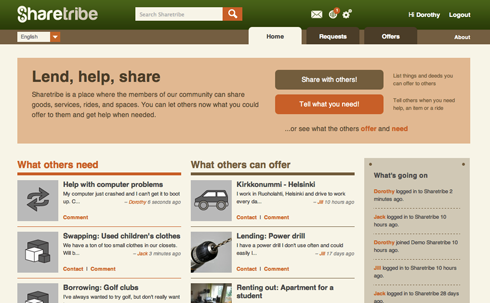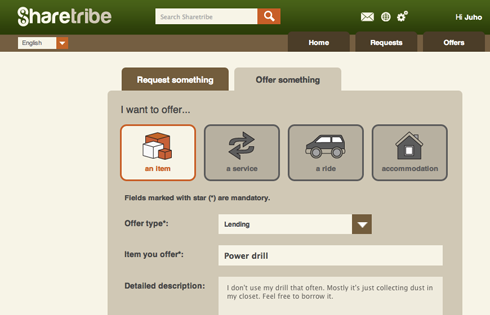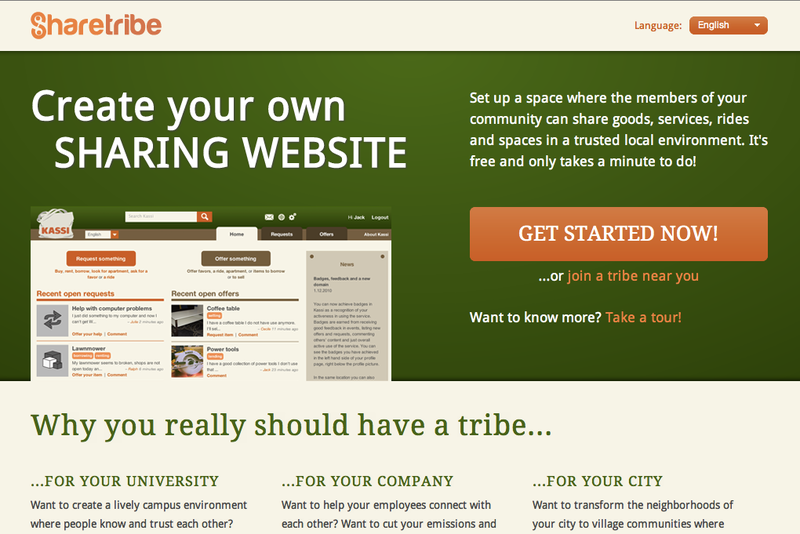UPDATE September 2014: Sharetribe has changed significantly since this post was published. Today Sharetribe is a technology platform that enables anyone to create a peer-to-peer marketplace. The platform can be customised for any type of selling, renting and sharing of services and products. Anyone can easily set up their marketplace without knowing how to program. We offer a payment system that makes it easy for users to pay for their purchases. Depending on the plan chosen, Sharetribe may charge a small fee for each transaction. Instead of Ning, Sharetribe is more like Shopify. Learn more about the current version of Sharetribe here.
Neal Gorenflo wrote a thoughtful post on the issues related to neighborhood stuff sharing. In the post he noted that while there are a huge number of sharing sites out there, so far none of them has managed to gain significant traction.
In the end of the post he offered some suggestions on how to get neighbors to share their stuff. One of the suggestions, "Sharing Meets Community Organizing", really struck a chord. I believe the answer is to empower the offline networks we already have – whether they are our neighbors, fellow students or colleagues at work. We need to give people tools to share within these networks, and the community organizers the tools to facilitate this sharing.
This is the approach we are taking with Sharetribe. Everyone can go to our site and create their own “tribe”, a peer-to-peer marketplace just for their community – whether it’s a sports club, neighborhood, university, congregation or a company. It’s essentially the Ning model applied to the sharing economy.
These marketplaces are highly customizable: people can change the texts, logos and soon also the colors to match the look & feel of their community. They can get their own domain. They can keep the tribe open for everyone or make it private and only let people in with invites, or with certain email address (like .edu). People can choose whether they want to share only goods, services, rides or spaces, or even all of them. The platform can be used for lending, renting, selling and swapping. It’s really up for the people to decide what and how they want to share.
All this makes the people feel it’s really their own thing – a place where they feel like home. By giving local admins the tools to invite new members and manage the community, we can solve the two big problems of the sharing economy – having enough traction in the area just around you, and creating trust between people.
Here are just two examples of how Sharetribe is used today in various different contexts: a single parents network from Oakland, a private group with only 50 members, and Aalto University campus in Helsinki, with almost 5000 members. We already have almost 400 tribes started all over the world, and the number is growing every day.

Unlike many sharing economy startups, we don’t charge a commission for transactions. That model makes a lot of sense when sharing more valuable items, like apartments or cars, in a global marketplace. But our approach is more about the community than the money. As Micki Krimmel of Neighborgoods and Favortree points out, sharing everyday goods and favors within your community can be motivated by totally different things than money, and creating a heavy transaction process might just be in the way. We want to let people use money if they want to, but also enable lending, helping out and giving away stuff for free.
Instead, our business model is white labeling. The tribes are free until the first 50 users. After that we require a monthly upkeep fee. It’s a lot like the initial Zimride model, but simplified: you can start the tribe, customize it and pay for it online, just like in Ning. Charging the communities not only pays our bills, but actually also helps us scale. When a community starts to pay for a service like this, they are also more determined to get their members to actually use it, so they will use their existing communication channels to make sure everyone gets on board.
In his article Neal mentions that the community organizing approach is not scalable. I think we've found the right approach to make it scale: to let people start their own tribes for free, to have various different types of tribes and to let people belong to multiple tribes at the same time.
Let's say the first tribe you join is at your workplace. One day you get an email saying, "Did you know you could also start a tribe for your association?" You just happen to be very active in your sailing club, and gear lending is a constant issue, so a new tribe gets started.
We’ve noticed that people share different things with their different networks: sharing rides to work with colleagues, finding someone to walk your dog from the neighborhood, and only lend your electric guitar to your best friends. With our tribe-based approach this becomes really easy. Our approach is a bit like sharing your digital assets with different circles in Google Plus, but applied to physical assets.
Open Source
One company I really look up to is Automattic, the creators of WordPress. I love how they took over the blogging market with an open source product, created an amazing ecosystem on top of that and also managed to create a sustainable business with tens of millions of yearly revenue.
We want to apply the WordPress model to the sharing economy. Our code is completely open source, available with the MIT license, so everyone can easily download it and start a tribe on their own server.
We realize that sharing is a very local phenomenon, and different countries and cultures might require very different approaches. We hope that the customizability of our platform will help us tackle that problem, and that we will be able to create a community of sharing-minded developers who will help people share using our platform in different markets and contexts.
In addition to opening up our code, we also try to share everything else we have with others, starting from our data (along the lines of the Sharing API) and all the way to our business documents (we'll try to keep most our documents non-confidential and add them to a public folder, so that others could benefit from not having to write everything from scratch). In our blog we share the lessons we learn along the way, so others can avoid making the same mistakes and possibly take advantage of the good practices we encounter. We believe that sharing truly is the future of business too.

Combining Online and Offline
I wrote a piece on trust in the sharing economy for Shareable earlier this year, and criticized TrustCloud's approach a bit. They contacted me immediately after the article was published, and we've been having numerous chats with them since then. We’ve come to realize that of all the “trust aggregator” startups out there, they currently have the most advanced product. It’s obviously not yet perfect, as it’s still the early days, but the best way to get to where we’d like the product to be is to work with them.
So, we've decided to partner with them in a few different levels:
- We've implemented TrustCards. They’re currently being tested in a few of our tribes. Here's my personal profile in one of those tribes, with my TrustCard attached.
- We'll be doing some co-marketing with them. They will help us get some pilot tribes in the US, and we will try out TrustCards in those tribes.
- We will soon – when our API is ready – start providing them transaction data. People will be able to add Sharetribe as one of their networks in TrustCloud, after which the reviews they've received in Sharetribe will affect their TrustCloud score and badges.
- We will try out each others' products a lot and try to give a lot of constructive feedback.
TrustCloud is very good at aggregating all your online information to one place. We at Sharetribe are focusing on empowering your offline networks. We believe that combining your online and offline identities is the key to truly bring the sharing economy mainstream.
The great internet marketer and writer Seth Godin has said something along the lines of, “If you want to change the world, you need a tribe”. I couldn’t agree more. So, if you want to start a tribe of your own, get started here.









